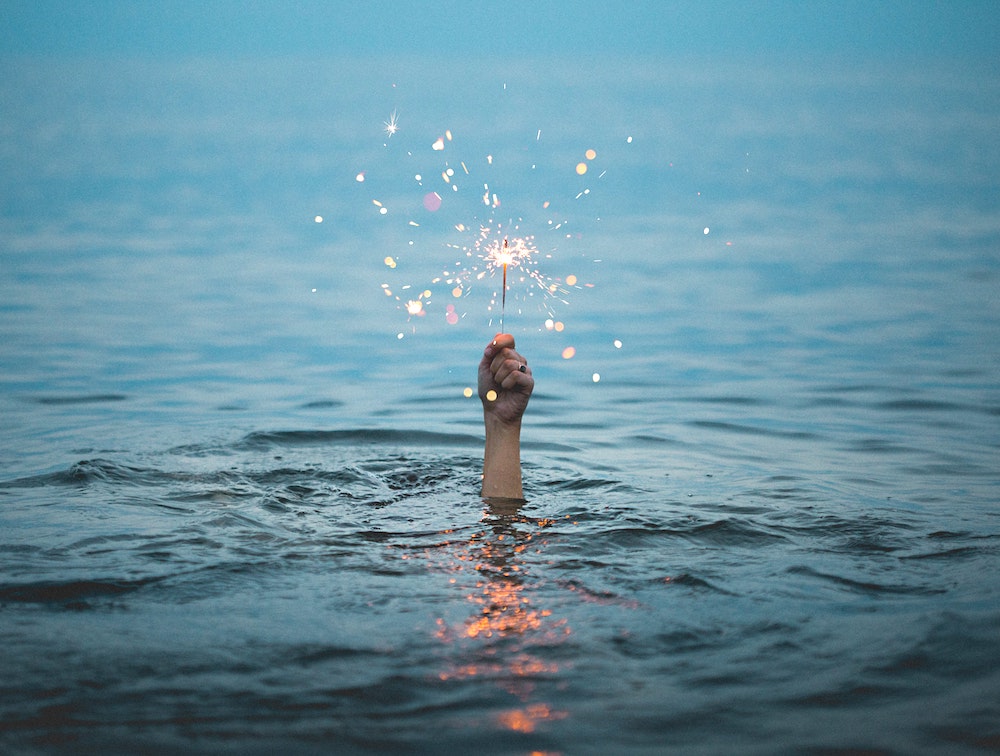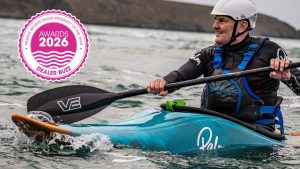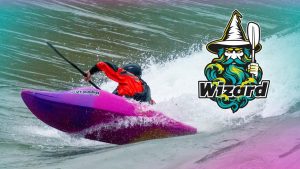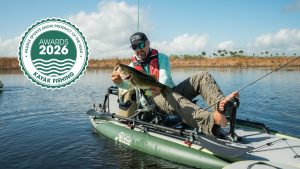Nearly two years of lockdowns and pandemic-living created new challenges and a new market, bringing inspiration and innovation in nearly every sector of paddlesports.

There might not have been much product on store shelves in 2021, but that doesn’t mean nothing was happening in the design room. Instead, “The pandemic forced most companies to take a good, long look at where they sit in the marketplace. It’s been an introspective moment for many as R&D almost felt like a luxury,” muses James McBeath of Jackson Kayak. Despite the challenges of 2020 and 2021 many companies worldwide invested heavily in innovation. New developments took place in multiple areas, from new boats and boards to new partnerships and finding ways to increase production, be more environmentally friendly, or prioritize the customer experience.
Innovation is “the practical implementation of ideas that result in new goods or services or improvement in offering goods or services” (User Experience UX). Product-wise, recent innovations in paddle sports are evident. Many companies unveiled new product lines and designs in 2020/2021 and are already working on more. “During the Corona Pandemic, the whole industry had a busy time getting boats and paddles to our customers, but we can’t stop making new products just because of that,” says Jochen Lettmann. “Our R&D Team is thinking of new designs every day.” Lettmann, whose production happens in-house, put out ten new boat models and three new paddle designs in the last two years. “For next year, we are planning on at least four new kayaks and a new paddle so that we will have new toys for our customers and us in 2022.”
Innovation doesn’t happen overnight. “Yes, the past two years have allowed for innovation— mainly because anything really worth innovating on is being thought about three years in advance. What we were working on was being done well before the multitude of issues that Covid brought upon our industry,” explains Stig Larsson of the Canadian-based Level Six. “If anything, Covid has allowed us to introduce some products a little faster because we have sold clean on existing inventory at a faster pace than anticipated, which allowed us to fast track production on newer product lines.”
“In times of crisis, innovation is not just the key to adapting to a new situation but also unlocking post-crisis growth”
From collaborations to new technologies, what we want and need influences innovation. The pandemic has impacted both. Spade Kayaks took advantage of the downtime in production and shipping to develop paddle and apparel lines. CS Canoes won the 2021 Paddle Sports Sea Kayaking Product of the Year Award for their NZ, a collaboration between owner Sandro Spagnol and five-time Wildwater World Champion Nejc Žnidarcic. Žnidarcic wanted a fast, lightweight boat he could paddle on lakes, rivers, and the sea. Need-based innovation at CS Canoes took place in production as well. “With the high demands for our boats, we upgraded our equipment with new high-pressure pumps for infusion. This technology allows us to build up to 12 boats at the same time. With the new high pressure pumps, our boats are even lighter and stronger than before,” they share on their Facebook page. At Pyranha Kayaks, pandemic supply disruption forced the company to change the exterior bolts and washers on their whitewater boats, resulting in more time-efficient manufacturing and a better customer experience.
Apparel companies pursued new materials, processes, and partnerships, aiming for greater durability and a smaller environmental impact. “Here we are, five decades later, proudly introducing an entirely new fabric in collaboration with our oldest and strongest vendor partner, W.L. Gore and Associates,” announced Kokatat when launching their new GORE-TEX PRO fabric. In September, NRS announced their partnership with GORE-TEX and plans for a high-end dry wear line that has been revamped from cut and color to zippers. Level Six and Hiko Sport pursued sustainable fabrics and production techniques like Hiko’s limestone-based E.Prene, which uses dope dying, water-based glue, and recycled carbon black for a more environmentally friendly production process. Meanwhile, Slovenian-based Stand-Out SUP introduced their new Terra line of dry gear, featuring a new material made 100% from recycled polyester salvaged from waste yarn from abandoned garments, fishnets, discarded fabrics, and other post-production waste. Pete Astles of Peak Paddlesports hopes the innovation continues. “I’m really keen to see a big move towards more sustainable products and less single-use packaging. Manufacturers should look to source recycled and more sustainable raw materials, reduce their carbon footprints and environmental impacts.”
Innovation isn’t always big, marketable, and flash. “Most (changes) are the opportunity to make business improvements: offering better service or training staff to be multiskilled,” reminds Palm Equipment’s Paul Robertson. “In times of crisis, innovation is not just the key to adapting to a new situation but also to unlocking post-crisis growth,” opines Hobie Sales Manager Europe Gero Priebe. “Whether this is a product innovation or new retail opportunities, for example, it is always important to identify and quickly address new opportunity areas being created by a changing landscape.” In 2020 and 2021, companies began to fill in the gaps we’ve discovered. 2022 and 2023 will be even take it even further.



